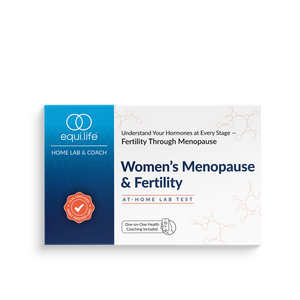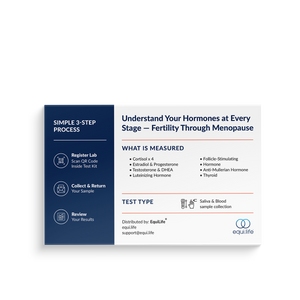


Your monthly menstrual cycle is likely not something you look forward to. Nonetheless, when it arrives off schedule it can be a cause for concern, especially if you are experiencing other challenges including trying to become pregnant. Whether you want to assess your reproductive health or want to gain insight on irregular cycles, this convenient at-home test provides a comprehensive look at a broad range of hormones, so you can gain valuable insight about how to address potential imbalances at a root cause level.


The female body is nothing if not complex! While we consider estrogen and progesterone to be the main female sex hormones, there is much more to consider when struggling to become pregnant or when trying to get the bottom of irregular cycles. In addition to these main hormones (and their ratios), this test also looks at testosterone, DHEA, a full range of thyroid hormones as well as those related to ovulation and egg implantation. Additionally, the stress hormone cortisol is included to ensure an in-depth assessment of your biggest (and most sensitive) health challenges.
When you're ready to start a family or facing concerns about your overall menstrual health, encountering challenges can add unnecessary stress to your journey. The good news is that there is a convenient at-home test that will provide and in-depth evaluation on a range of sex and related hormones so that you can feel confident and supported in the next steps, addressing potential imbalances at the root cause level.
A steroid hormone produced in your adrenal glands, affecting several aspects of your body, including regulating your body's response to stress.
Cortisol, the body's stress hormone, is made from precursors that include progesterone. If stress levels are high on an ongoing basis, progesterone levels may decrease, disrupting the balance of estrogen and progesterone in the body.
Additionally, cortisol can inhibit secretion of TSH (thyroid stimulating hormone), leading to partial suppression of thyroxine, the main hormone produced by the thyroid gland.
Test looks at a range of female hormones and their critical ratios, from estrogen, progesterone, testosterone, DHEA and more.
Looking at the full range of thyroid hormones including; T3, T4, TSH and TPOab
EquiLife labs are designed to provide detailed and thorough information so that you can understand your health at the deepest level, allowing you to finally get to the root cause of your biggest health concerns.
To ensure you feel confident about your lab findings, EquiLife provides a complimentary, one-on-one call with a certified Health Coach who will review your results with you in-depth and answer any questions you have.
Testing takes the guesswork out of your health and empowers you to make informed choices about your health. After reviewing your results, Health Coaches will provide recommendations to help you achieve your goals.
After you check out with your at-home lab, it will arrive promptly to your door. Follow the easy instructions included for registering your test before you send in your sample(s).
Each at-home lab comes with detailed instructions for collecting your test sample(s) and returning them to one of our CLIA certified lab testing facilities.
Once your samples have been processed, you will receive an invitation through EquiLife’s Ayubowan app to schedule your one-on-one health coaching call to review your results in-depth.
Get to the Root Cause
Once you receive your at-home lab test, please follow the instructions provided to register your test. Once sample(s) are sent to one of our CLIA certified labs, it will take approximately 3 weeks for your results to be returned, during which time you will receive information on how to schedule your one-one-one health coaching call.
Do not eat, drink (except water), or brush teeth at least 2 hours prior to collections.
All at-home lab tests expire 6-months from their purchase date. To ensure you will receive your results, please be sure to send all samples for completed lab tests prior to the 6-month expiration date. Unfortunately, there can be no returns or replacement lab tests sent after the 6-month time frame.
Please remember to register your labs prior to sending your sample to the laboratory.
You can contact us at support@equi.life for general questions.
If you have a more specific question about your sample collection you may reach out to the lab directly to better guide you - each instruction sheet has the contact information available to get your questions answered promptly!



